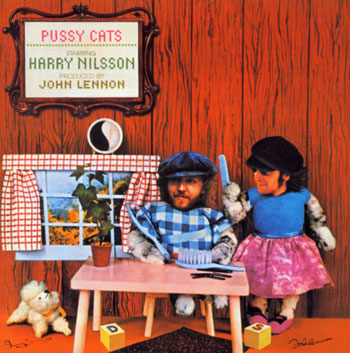
Pussy Cats (1974)
Since receiving unsolicited public praise for his work from Lennon and McCartney, Nilsson had maintained a friendship with the members of the band; in fact, 1973’s Son of Schmilsson dovetailed with Harry’s involvement in the ill-fated Ringo Starr film Son of Dracula. Now, for the follow-up to Son of Schmilsson, Nilsson turned to John Lennon, who had become a frequent drinking buddy, for production and collaboration. RCA was delighted–at first.
As it turned out, the sessions for what was to become Pussy Cats were recorded during Lennon’s infamous “lost weekend,” a monthslong binge of alcoholic carousing that Nilsson was only too happy to be a part of. The public high point came when Lennon and Nilsson, with tampons tied to their hats, showed up at a Smothers Brothers comedy club, and were ejected for heckling. Whatever his artistic merits, Nilsson was not known for recording albums cheaply, and Pussy Cats was another high-budget affair.
It was also a drunken mess. This had serious consequences, not only for the album, but for Harry, who fell asleep on the beach one night and wound up with a throat infection. Determined not to stop recording, for fear that the increasingly erratic and temperamental Lennon would leave the project, Nilsson hid his condition from Lennon as best he could. One questions how Lennon could have possibly been unaware; Nilsson was spitting blood, shredding his throat, and destroying his vaunted three-and-a-half octave voice. It would never return. In time, Nilsson’s soaring tenor would be replaced with a warmly ragged instrument, one that would prove more effective for delivering his late-period material. On Pussy Cats, however, it’s largely a mess, and actually painful to listen to in spots.
It has to be said, though, that Nilsson’s performance of Jimmy Cliff’s “Many Rivers to Cross” could not have been the agonizing masterpiece it is had his voice been in top form. He’s giving the song literally everything he has, and the listener can feel it. Soaked in brandy and regret, this is one of my favorite Nilsson albums. In the end, though, it failed to make much of an impression on the charts, or solve Harry’s problems with RCA. The label was unamused with Nilsson’s proposed title, Strange Pussies, and starting to lose its patience.
Harry Nilsson – Many Rivers to Cross
Harry Nilsson – All My Life
Harry Nilsson – Don’t Forget Me
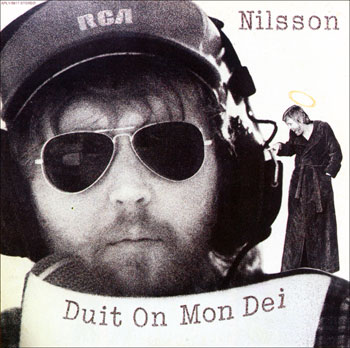
Duit On Mon Dei (1975)
Duit On Mon Dei (sound it out) is a confused muddle, with neither the sentimentality nor the wit of Nilsson’s best work. It begins with a snippet of a song that would ultimately end up on his next album, and rolls downhill from there, alternating between syrupy ballads and half-baked jokes. Old films, television, disco, and religion were by now familiar themes for Harry and his listeners; he breaks no new ground here. The album’s diffuse nature can be at least partially attributed to Harry’s new record contract–during the Pussy Cats period, upon finding out that Nilsson was nearing the end of an unfavorable deal with RCA, Lennon dragged his friend into the label’s offices and angrily demanded that Nilsson be paid what he was worth. The result was a million-dollar deal, one that saw RCA entirely eating the recording costs of Harry’s albums rather than charging them against future sales. It was a landmark deal, and Nilsson never stopped crediting Lennon for it. The new contract also gave Harry the freedom to self-produce his next release, which is why Duit On Mon Dei is basically an audio document of the artist and a large group of his closest musical friends in the studio.
Not that he’d lost his artistic drive–unbelievably, the songs on the album were all recorded live, without instrumental or lead vocal overdubs. Even in 1975, this was rare. It’s unfortunate that it wasn’t done in support of stronger material. There was yet another tussle between Nilsson and RCA over the album’s title–he wanted to call it God’s Greatest Hits, they refused–which leads the listener to question whether anybody at the label bothered to listen to the album’s closing track, “Good For God” (Now I say good for God/Good for God/He goes and makes the planet blue/And all the thanks he gets from you/Is “look at all this poo poo in the yard”).
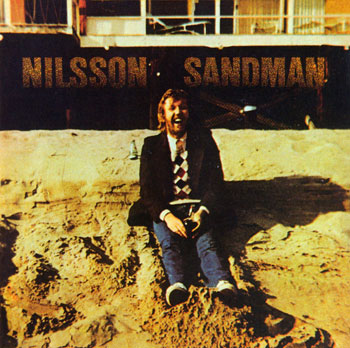
Sandman (1976)
Though it was a total chart failure, Sandman represented a stunning return to form for Nilsson. Though critics still griped that he had lost the loving attention to detail that had made his earlier work so great, this batch of songs perfectly fuses Harry’s simultaneous attractions to the sacred and profane. The album begins with “I’ll Take A Tango,” and the line “Deep down in my soul, I hate rock & roll”; the next song, “Something True,” is flat-out one of the most beautiful love songs recorded by Nilsson (or anybody else during his ten-year tenure at RCA). And so on and so forth. In spots, he actually seems to be writing the lyrics as he goes along–”Jesus Christ You’re Tall” is a three-minute joke about sex between tall people that gets progressively more ridiculous as it goes along. And then there’s the album’s true masterpiece, “How to Write A Song,” which includes the following lines:
Now let’s assume you are just an asshole
And there’s nothing in your brain
It might help if you remember these helpful little hints
Don’t try to rhyme “silver” with anything, yeah
That goes for “orange” as well
Now notice how cleverly I just used them both
And all I have to do is rhyme “well”
Harry’s fans had largely stopped listening. The label had stopped waiting for a hit. Nilsson’s next album would be an altogether different affair.
Harry Nilsson – I’ll Take A Tango
Harry Nilsson – Something True
Harry Nilsson – Here’s Why I Did Not Go To Work Today (Thursday)
Harry Nilsson – How To Write a Song
Harry Nilsson – Jesus Christ You’re Tall
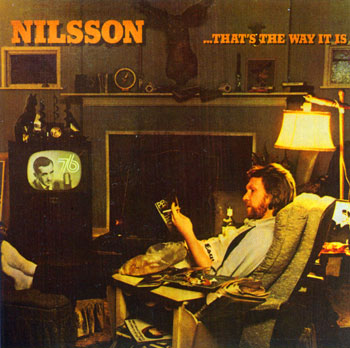
…That’s The Way It Is (1976)
This album is probably the low point of Nilsson’s catalog. Caving in to RCA’s demands that he bring in an outside producer and outside material, as well as demands from the critics and fans that he go back to making the kind of music he did before, Harry threw together this uninspired collection of material. Mostly covers, the set drew attention for Harry’s version of Randy Newman’s “Sail Away,” which, truth be told, falls far short of the original. Overall, it’s a toothless affair, lacking the biting cynicism of his best work from any period. The album’s one shot at humor, “She Sits Down On Me,” is about a woman who gets a tattoo of her lover’s face on her ass. Just knowing that RCA found this collection more acceptable than Sandman explains much of what has always been wrong with the music industry.
Harry Nilsson – She Sits Down On Me
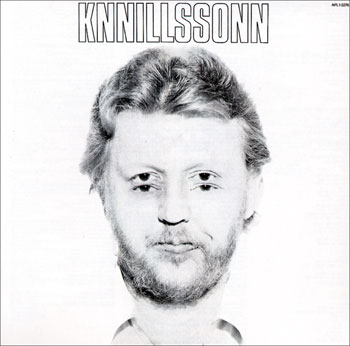
Knnillssonn (1977)
Knnillssonn was completely unlike its predecessor, or any of the albums Harry had released before that, or pretty much anything else in the modern catalog of RCA or any other label. That’s a bold statement, but so was Knnillssonn, which found Nilsson going completely for broke–he abandoned the jaundiced perspective and scatological humor he’d been mining for most of the decade, for one thing, but that was only the beginning. He ditched the traditional rock combo approach too, opting instead to record the album with an orchestra, percussion, acoustic guitars, minimal keyboards, and–as lead instrument–a six-string bass. The result is his most cohesive album, and a thing of absolute beauty. Just listen to the opening song, “All I Think About Is You,” and try to keep from smiling. Harry was happily remarried, a new father, at the top of his artistic game–the picture of bliss, in other words, and Knnillssonn was the result. Here, at long last, was an album RCA could get squarely behind, and a major promotional campaign was set in motion.
Then Elvis died.
Elvis’ death might not seem to have anything to do with Harry Nilsson, but it meant that the Presley catalog suddenly became RCA’s number one priority. The label, never what you’d call “well-managed,” had been desperately seeking a hit; now, with the death of its biggest artist, RCA found that all it needed to do was flood the market with Elvis. Harry, along with most of the artists on the label, was left by the wayside. He exited his contract in frustration and disgust.
Harry Nilsson – All I Think About Is You
Harry Nilsson – Blanket For a Sail
Harry Nilsson – Lean On Me
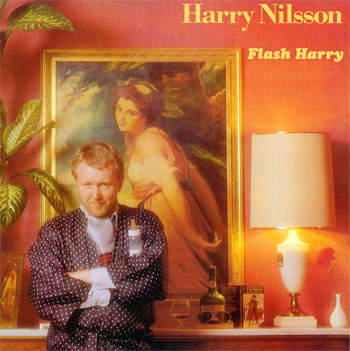
Flash Harry (1980)
For many people, the story ends with Knnillssonn, and that would be a fitting end. Even if Harry had never recorded another note, he would have left behind a catalog of inestimable worth, not to mention having gone out on a high note. He resurfaced a few years later, however, with Flash Harry. It’s not a bad album, not a great album, sort of a trifle–pretty much what you’d expect from an album that begins with Eric Idle singing “Harry” and ends with Harry singing Idle’s Monty Python classic “Bright Side of Life.” It was never released in the States, and has never been released on CD, but here are a few pieces of Flash Harry anyway:
Harry Nilsson – Best Move
Harry Nilsson – Bright Side of Life
Harry Nilsson – Cheek To Cheek
Harry Nilsson – Old Dirt Road
And the rest, as they say, is history. Harry devoted himself to non-musical pursuits, particularly after the murder of his friend John Lennon; in the years after 1980, he worked mostly on film and stage productions. That’s Harry doing the music for the much-hated Robin Williams/Shelley Duvall Popeye movie; that’s Harry producing the justly forgotten Whoopi Goldberg film Burglar; that’s Harry singing “How About You” over the closing credits of his friend Terry Gilliam’s 1991 movie The Fisher King. Toward the end of his life, as his health worsened and he understood the end was near, he developed a stronger interest in releasing another album, which was referred to as Papa’s Got A Brown New Robe. He worked on the album throughout the late 1980s and early ’90s, but it was never finished; on January 15, 1994, a heart attack claimed Harry Nilsson’s life.
Since his death, Nilsson’s catalog has seen periodic upgradings and reissues, but these tend to go quickly out of print, and a comprehensive overhaul is still necessary. His name isn’t widely known today. Blame the tin-eared cheapskates at RCA.




Comments